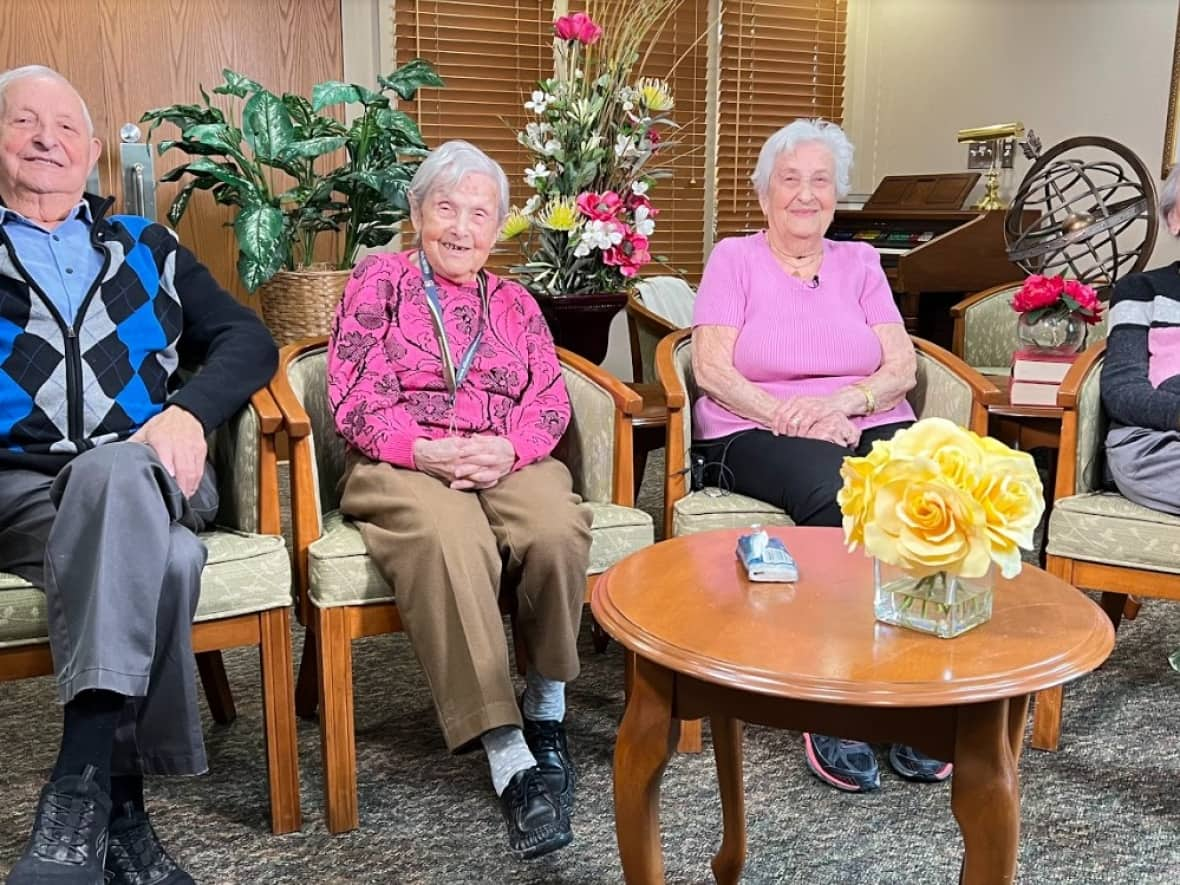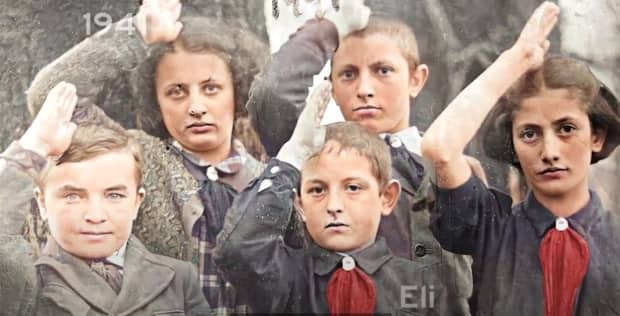'Living is an honour': Bond between world's oldest Holocaust-surviving siblings forged in brutal time

They are believed to be the oldest living Holocaust survivor siblings anywhere in the world, and they live in Winnipeg.
Sisters Ruth Zimmer, 96, Anne Novak, 99, Sally Singer, 101, and their brother Sol Fink, 97, grew up in Sanok, in southeastern Poland, before the Second World War forever changed their family.
Today the surviving siblings share an unbreakable bond — and a similarly strong desire to tell their story.
"Living is an honour. I'm not ashamed to tell everyone how old I am because it's good to live," Novak said during a recent interview at Shaftesbury Park Retirement Residence, which the sisters call home these days.
Life is something Novak treasures because it was taken from so many others, including their brother Eli, who was two years younger than Zimmer, and 80 other members of their extended family.

Days after the German invasion of Poland on Sept. 1, 1939, the five siblings fled to their grandparents' home in the nearby village of Tyrawa Wołoska, along with their parents, Shaindel and Zecharia Fink.
When that village fell under Russian control in 1940, Polish Jews who fled to Soviet territory were required to declare whether they wanted to become Soviet citizens or return to German-occupied Poland.
The Finks said they preferred to go back to Poland, according to the Shoah Foundation, a California non-profit dedicated to recording interviews with Holocaust survivors.
But instead of sending them back, Russian authorities arrested them — and other Jews who opted for repatriation — in the middle of the night, to send them to Siberia.
They were taken to a train station. As the family waited in a cattle car, Eli dashed out and ran back to his grandparents' house.
The rest of the family was put into forced labour in Siberia, where they received occasional letters from Eli. When the Nazis invaded in 1941, the Soviets set the workers in Siberia free and the Finks escaped to a village, where they lived in a cramped cottage and worked on a communal farm.
They lived there for the next few years, sharing one pair of boots between them and enduring hunger and terrible cold in their cottage, which also served as a makeshift synagogue for the village.
Meanwhile, the letters from Eli ceased.
'A beautiful boy'
When the war ended in 1945, the family walked 100 kilometres to a train station to return to Poland. There the siblings learned that Eli, their grandparents and other relatives had been deported to concentration camps and put to death.
The surviving family members later joined refugees crossing illegally into U.S.-occupied Germany and arrived at a displaced persons camp. They were eventually sponsored by a relative to emigrate to Winnipeg in 1948.
"My father fell and kissed the ground, literally kissed it," Zimmer recalled in an interview with CBC this week. "He says, 'Oh, we are in the best country.'"
When asked how often she still thinks of Eli, her answer was solemn and short: "Every time I eat."
"A beautiful boy," Fink added, then stretched out his arms as if reaching for something. "I tried to save his life. It breaks my heart."
The siblings have photos of Eli, from his time growing up and attending school in Poland. One thing they all note is his expression in nearly every picture.
"He has such a sad face … like he would feel that something will happen," Novak said.
"I imagine that he missed us and the parents very much," added Zimmer.

Despite living through dark times, the siblings are a constant source of light. They laugh and tease each other, crack jokes about their ages, and sing.
"We can be very playful. Sometimes in the evening … we sing and reminisce and we think about the old time," Novak said.
"There is nothing more beautiful and wonderful for me than this, what is happening. We love to get to be together," said Singer.
"I know there are families that hate it, to be together, but we just love it. We always find a song."
Better call Sol
Zimmer believes that relationship is why all four siblings are near — or past — the century mark. It's also how they survived the cruel days.
The family has expanded through children and grandchildren. The sisters all had kids at the same time, always lived within walking distance of one another, and even ran a café in a Jewish nursing home for some time, according to the Shoah Foundation.
Fink might be the sole surviving brother, and the only sibling not living at the retirement home, but he is as close as ever to his sisters. He lives nearby and often visits, bringing a tool or two with him.
"I have to tell you about my brother, that he is the best brother. There is no thing that he wouldn't do for us," said Novak. "If the electricity is out or something, we call Sol. Sol is there the moment you call him."
"It's true," said Zimmer, adding her brother is there "if the door is broken, or the lock."
"That goes for all of us," said Singer, as Fink beamed beside her.
Their bond may have been forged in times of horror, but it has been fortified by love — and deep gratitude to Canada.
"I'm very happy that I'm in Canada. Canada is a wonderful country," Novak said, sparking happy applause from Zimmer.


